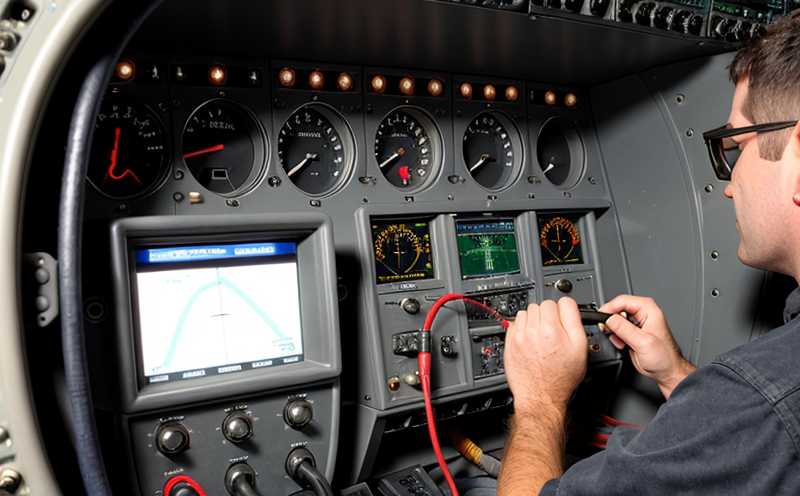FAA TSO-C119 Weather Radar System Testing
The Federal Aviation Administration (FAA) Technical Standard Order (TSO)-C119 establishes design and manufacturing standards for weather radar systems used in aviation. This test ensures that the radar meets stringent performance criteria to ensure safe, reliable operation under various atmospheric conditions.
Our laboratory specializes in FAA TSO-C119 testing, providing comprehensive services aimed at ensuring compliance with the latest regulatory requirements. Our team of experts applies rigorous testing protocols to evaluate the radar’s performance parameters, including but not limited to accuracy, resolution, and reliability.
The weather radar system is a critical component for aircraft navigation during low-visibility conditions. It plays a pivotal role in providing pilots with real-time information about atmospheric conditions, thereby enhancing situational awareness and decision-making capabilities.
TSO-C119 requires the testing of several key parameters to ensure compliance:
- Accuracy: Ensuring that the radar system accurately detects weather phenomena within specified error margins.
- Resolution: Measuring the ability of the radar to distinguish between closely spaced objects, which is crucial for precise tracking and identification.
- Reliability: Evaluating the system's performance under varying environmental conditions to ensure consistent operation over time.
- Emitting Power: Ensuring that the radar complies with emission standards to prevent interference with other electronic systems.
- Interference Resistance: Assessing the system’s ability to operate without being affected by external electromagnetic interference.
- Detection Range and Coverage: Confirming the radar's operational range and coverage area, ensuring it meets regulatory requirements for safe operation.
- Data Processing Speed: Evaluating the speed at which data is processed and displayed to ensure timely information delivery.
- System Stability: Ensuring that the system remains stable under various operating conditions to maintain consistent performance.
The testing process involves a series of controlled experiments, environmental simulations, and data analysis. Our laboratory employs state-of-the-art equipment and facilities designed specifically for aerospace and aviation testing. The facility is equipped with climatic chambers capable of replicating extreme weather conditions, ensuring that the radar system performs reliably under diverse atmospheric conditions.
Our team of experts conducts thorough inspections and performance evaluations to ensure full compliance with FAA TSO-C119 standards. We provide detailed reports that document all test procedures, results, and recommendations for improvement or certification.
The importance of this testing cannot be overstated in the aviation industry. Non-compliance can lead to significant operational disruptions, safety hazards, and regulatory penalties. Our comprehensive testing services ensure that your weather radar system meets the highest standards and is ready for safe and reliable operation.
Applied Standards
The FAA TSO-C119 Weather Radar System Testing is governed by specific international standards and regulations, including:
- Federal Aviation Regulations (FAR): The regulatory framework for aviation safety in the United States.
- FAA TSO-C119: Establishes design and manufacturing requirements for weather radar systems used in civil aircraft.
- ISO/IEC 80004-2:2017: Provides guidance on the use of standards for electromagnetic compatibility (EMC).
- EN 50159: Specifies EMC requirements for railway applications, which can be cross-referenced for aviation systems.
- ASTM E368-12: Offers standard practice for lightning protection of buildings and other structures.
- IEC 61400-29:2015: Provides guidelines for the measurement, modeling, and prediction of wind turbine noise.
The compliance with these standards ensures that the weather radar system meets the highest safety and performance requirements. Our laboratory adheres strictly to these regulations during the testing process to ensure accurate results and reliable outcomes.
Our team continuously updates its knowledge base regarding the latest regulatory changes and industry best practices, ensuring that our services remain aligned with current standards and expectations.
Scope and Methodology
The scope of FAA TSO-C119 Weather Radar System Testing encompasses a wide range of performance parameters critical to aviation safety. Our testing methodology is designed to evaluate the radar system's compliance with all specified requirements outlined in TSO-C119.
Environmental Simulations
- Replication of various weather conditions, including heavy rain, snow, and lightning.
- Temperature variations from -40°C to +50°C to assess the radar's performance in extreme climates.
- Humidity levels up to 100% RH to evaluate the system’s reliability under high moisture conditions.
Operational Testing
- Evaluation of radar accuracy and resolution under different atmospheric conditions.
- Detection range and coverage area verification in controlled environments.
- Data processing speed assessment to ensure timely information delivery.
Interference Testing
- Evaluation of the radar's resistance to electromagnetic interference (EMI).
- Demonstration that emissions do not exceed regulatory limits.
Data Analysis and Reporting
- Comprehensive analysis of test data to identify any discrepancies from TSO-C119 requirements.
- Preparation of detailed reports summarizing the testing process, results, and recommendations for improvement or certification.
The rigorous nature of our testing ensures that your weather radar system meets all necessary standards and is ready for safe and reliable operation. Our methodology guarantees accurate and reliable results, providing peace of mind to quality managers, compliance officers, R&D engineers, and procurement teams.
Why Choose This Test
The FAA TSO-C119 Weather Radar System Testing is an essential step in ensuring the safety and reliability of weather radar systems used in aviation. Here are several compelling reasons why choosing this test is crucial:
- Regulatory Compliance: Ensuring full compliance with FAA TSO-C119 standards helps avoid costly delays and penalties associated with non-compliance.
- In-Flight Safety: By meeting stringent performance criteria, the radar system enhances situational awareness and decision-making capabilities for pilots under low-visibility conditions.
- Operational Efficiency: Reliable weather radar systems contribute to efficient flight operations, reducing delays and improving overall air traffic management.
- Customer Confidence: Meeting regulatory requirements builds trust with customers and stakeholders, enhancing your reputation in the aviation industry.
- Performance Optimization: Detailed testing provides valuable insights into system performance, allowing for continuous improvement and optimization.
- Long-Term Reliability: Ensuring compliance with TSO-C119 helps maintain long-term reliability of the radar system, reducing maintenance costs and downtime.
Our laboratory offers a comprehensive suite of testing services tailored to meet your specific needs. Our experienced team provides expert guidance throughout the testing process, ensuring that you receive accurate, reliable results and actionable recommendations.





